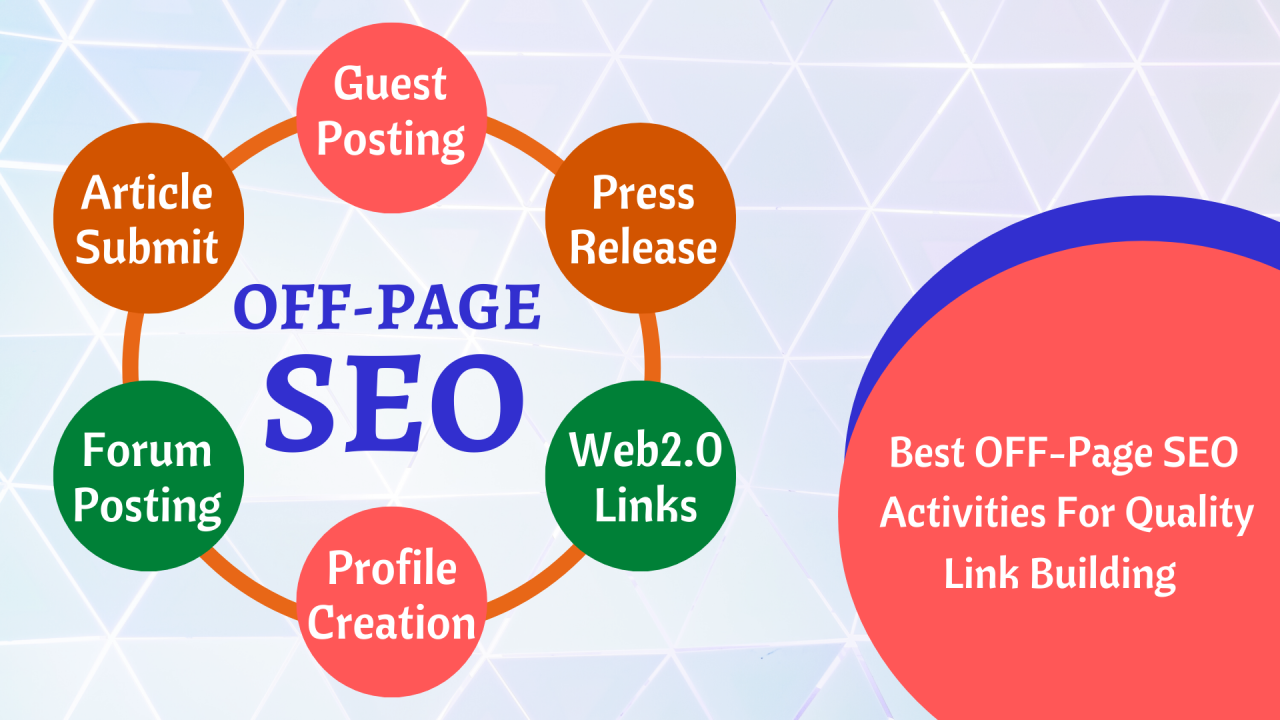Enhancing Off-Page SEO: Strategies for Successful Online Visibility
Improving off-page SEO is an ongoing process that requires consistent effort and adaptability. By implementing the strategies mentioned above, you can strengthen your website's authority, credibility, and visibility in search engine rankings.
In the realm of search engine optimization (SEO), off-page SEO plays a critical role in improving website visibility and attracting organic traffic. While on-page SEO focuses on optimizing website elements, off-page SEO encompasses activities performed outside of your website to boost its credibility, authority, and popularity. In this article, we will delve into various strategies and techniques to enhance off-page SEO and drive long-term success for your online presence.

- High-Quality Link Building: Link building remains a fundamental aspect of off-page SEO. Building high-quality and relevant backlinks from authoritative websites helps search engines perceive your website as a reliable and valuable resource. Focus on acquiring links from reputable sources through guest blogging, resource link building, social bookmarking, and influencer outreach. However, remember that quality triumphs over quantity when it comes to link building. A few authoritative links have more impact than numerous low-quality ones.
- Content Marketing: Creating and promoting valuable and shareable content is key to improving off-page SEO. Engaging content helps attract natural backlinks, increases social media engagement, and boosts your website’s visibility. Develop a content marketing strategy that aligns with your target audience’s interests and preferences. Create blog posts, infographics, videos, podcasts, and other forms of content that provide value, and promote them through social media, email newsletters, and outreach to relevant influencers and bloggers.
- Social Media Engagement: Active participation on social media platforms is crucial for enhancing off-page SEO. Establish a strong presence on platforms like Facebook, Twitter, LinkedIn, Instagram, and YouTube. Engage with your audience by sharing informative and compelling content, responding to comments and messages, and participating in relevant discussions. Encourage social sharing of your content, as it can lead to increased visibility and potential backlinks.
- Online Branding and Reputation Management: Building a strong online brand and managing your reputation are vital for off-page SEO. Consistently present your brand’s image across various online channels. Create a visually appealing and user-friendly website, optimize your social media profiles, and monitor online mentions of your brand. Address any negative feedback or reviews promptly and professionally. By establishing a positive brand image, you can enhance your website’s credibility and attract more organic traffic.
- Influencer Outreach and Collaborations: Partnering with influencers and industry experts can significantly amplify your off-page SEO efforts. Identify key influencers in your niche and establish relationships with them. Collaborate on content creation, interviews, or joint events to expand your reach and tap into their existing audience base. Influencers can help promote your brand, drive traffic, and acquire valuable backlinks from reputable sources.
- Online Directories and Local SEO: Listing your website on relevant online directories and optimizing your local SEO is crucial, particularly for businesses targeting a local audience. Claim your business profiles on platforms like Google My Business, Bing Places, and industry-specific directories. Ensure that your contact information, address, and website URL are consistent across all listings. Encourage customers to leave reviews, as positive reviews can boost your website’s visibility in local search results.
- Guest Blogging and Thought Leadership: Guest blogging allows you to demonstrate your expertise and expand your online presence. Identify authoritative websites in your niche that accept guest contributions and offer to write informative and valuable articles. Ensure that your guest posts provide unique insights and add value to the readers. Guest blogging not only earns you backlinks but also enhances your reputation as a thought leader in your industry.
Conclusion:
Improving off-page SEO is an ongoing process that requires consistent effort and adaptability. By implementing the strategies mentioned above, you can strengthen your website’s authority, credibility, and visibility in search engine rankings. Remember to focus on quality link building, create valuable content, engage with your audience on social media, build a strong online brand, collaborate with influencers, optimize local SEO, and leverage guest blogging opportunities. These efforts will contribute to long-term success and attract organic traffic to your website.
It’s important to note that off-page SEO should always be approached ethically and organically. Avoid black hat techniques such as buying links or participating in link schemes, as search engines have become increasingly adept at identifying and penalizing such practices. Instead, focus on genuine engagement, valuable content creation, and building meaningful relationships with your target audience and industry influencers.
Lastly, remember that off-page SEO is not a quick-fix solution. It requires time, consistency, and patience to see significant results. Monitor your website’s performance regularly, track the impact of your off-page SEO efforts, and adapt your strategies as needed. By continuously refining and enhancing your off-page SEO tactics, you can establish a strong online presence, drive organic traffic, and position your website for long-term success in the ever-evolving digital landscape.